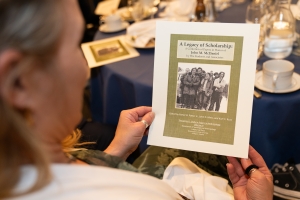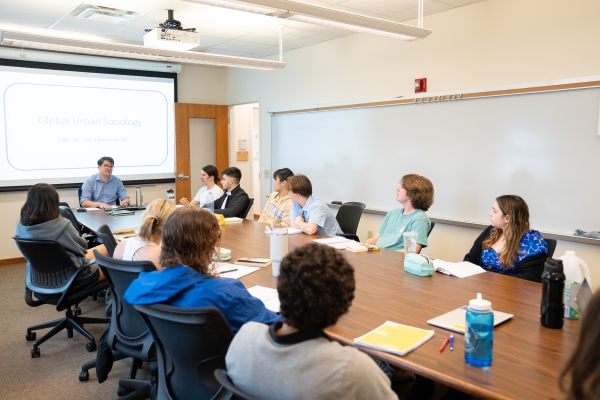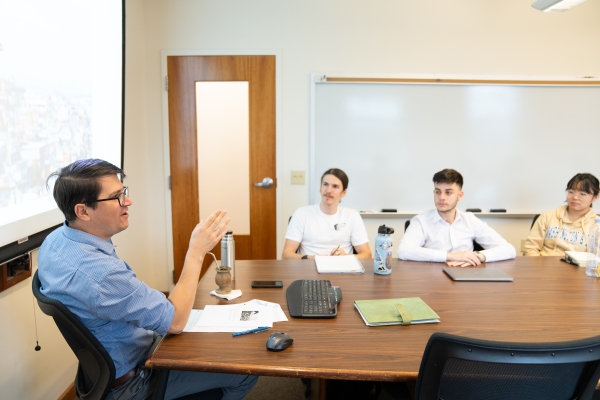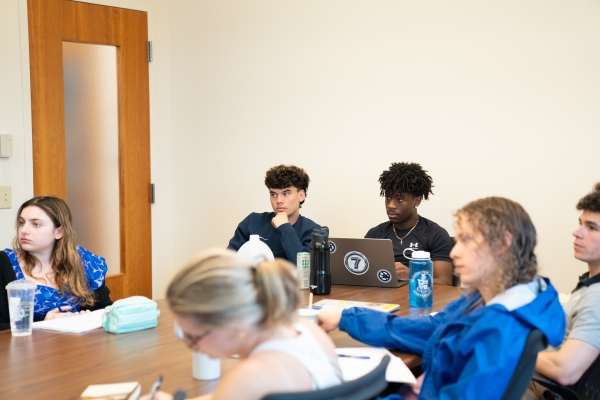
A Broader Perspective W&L students in the Spring Term course Global Urban Sociology are examining the social consequences of an increasingly urbanized world.

“Empathy is not just a good thing to do, but a powerful research tool. If you are able to place yourself in the position of someone else, you are more capable of understanding why they do what they do.”
~ Marcos Perez, assistant professor of sociology
Washington and Lee University students are turning their attention outside the Shenandoah Valley to study the consequences of living in an urbanized world in the Spring Term course Global Urban Sociology, taught by Marcos Perez, assistant professor of sociology.
At the heart of the class, which Perez is teaching for the third time, are the social consequences of a newly urban world, and how the “haves” and “have nots” in urban spaces interact with each other and with the structures around them.
For the majority of human history, people did not live in cities, but a shift occurred within the past two or three centuries marked by the Industrial Revolution that saw the exponential growth of both the global population and, consequently, the urban population. By the early 21st century, a majority of the world’s population were living — and continue to live — in cities.
Global Urban Sociology explores the complexities of urban life in our increasingly globalized world, and how political, economic and social changes impact urban centers and the people living in them — particularly marginalized populations. By examining the challenges caused by urbanization, the course seeks to restore agency to poor people in cities and understand how they react and adapt to structural changes.
“There is this idea that the poor don’t have agency,” said Perez, whose research interests focus on social movements of marginalized populations. “With good intentions, people will refer to the poor as victims, and with bad intentions, they will refer to the poor as responsible for their own mistakes. But people who are affected by poverty do something … and I study how they react to the undermining of their livelihoods and try to recreate a world they’re used to. And this has a huge effect on urban life.”
With only four weeks to dive into the social consequences of the world becoming urban, Perez has structured the course to first explore the evolution of global cities, then how urban dwellers are connected across social and economic stratification and interact not only with each other but with the structures that have shaped their livelihoods.
“There are structures that constrain and influence people in ways that people don’t even realize most of the time, and I think the point of any sociology class is to discuss these structures and the agency of the populations living within them,” said Perez. “[And within the structures] people can still make choices, and those choices have consequences. The question for this class is — how has this happened in the lives of urban dwellers?”

For Jessie Zhang ’26, understanding the lived experiences of marginalized communities within cities has been eye-opening and caused her to reevaluate her own experiences growing up in urban areas through a sociological lens.
“I lived in cities for a big part of my life, but I never realized how cities are a fairly recent development in human history,” said Zhang, a double major in religion and sociology. “But the most interesting thing I have learned at this point in the semester is the myth of rural virtue and how we romanticize living in peaceful rural areas, despite evidence that suggests living in urban areas can have a lot of benefits, too. In fact, some of the information I’m learning in this class is helping me think about where I want to live in the future.”
In studying how people experience urban life and how the structures of urbanization influence their decisions, Perez hopes his students will understand that behind every statistic “there are people like you and me” and there are tangible reasons for why people behave and live the way they do. Taking this understanding a step further, Perez wants to emphasize the centrality of empathy to sociological study.
“Empathy is not just a good thing to do, but a powerful research tool,” Perez said. “If you are able to place yourself in the position of someone else, you are more capable of understanding why they do what they do.”
Perez is clear that empathy does not mean sympathy, and practicing empathy is not intended to justify people’s actions; however, empathy will allow his students to better appreciate the decisions of urban dwellers and their reasons for reacting to global shifts in urban structures and livelihoods. Furthermore, empathy is a valuable skill that can be applied to a range of career fields because it allows you to understand people’s motivations and effectively address their needs.
“Empathizing is difficult, and we are resistant to empathize with people we don’t agree with or don’t like,” Perez said. “But it is a powerful way to understand human beings.”
The importance of empathizing with the lived experiences of urban dwellers has not been lost on Zhang, and she feels that the process of developing empathy is made easier by the class’s emphasis on discussion and the way Perez creates opportunities for her and her classmates to learn from each other.
“I always look forward to the class discussions because everyone adds different nuances, and I am always amazed by how knowledgeable my peers are,” Zhang said. “Especially since many of my classmates have very different academic interests, their opinions often challenge me to think more about the issue through perspectives I am not familiar with.”
For Perez, the opportunity for students to bring their diverse interests and perspectives to a focused topic is what makes Spring Term a hallmark of the W&L experience.
“The structure of the term creates the opportunity for a lot of discussion, and the students learn from each other as much as they learn from the instructor,” Perez said. “A good instructor will create the conditions in which everyone can learn from one another, and students teach each other all the time by having conversations and bringing unique insights to the class. The concentration of a Spring Term course — meeting every day, for several hours a day, and focused on the same topic — deepens that conversation.”


You must be logged in to post a comment.